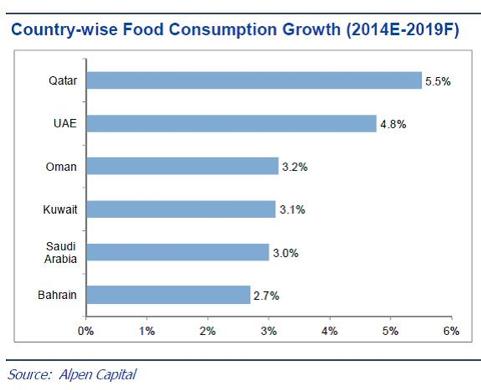
Food consumption in the GCC, backed by positive macroeconomic drivers, is expected to grow at a 3.5% CAGR between 2014 and 2019 to reach 51.9 million metric tonnes according to the recently released GCC Food Industry report by Alpen Capital.
Cereals are likely to remain the most consumed food category, accounting for 46.5% of the region’s total food consumption in 2019. However, rising consumption of high-priced protein-rich and healthy foods is expected to gradually eat into the share of cereals in the total food consumption.
“The food demand in the GCC is driven by several factors including a growing population base, increasing affluence and rising tourist inflow within the region. High health awareness and a developing taste for a westernised diet, introduced by the increasing expatriate population, are bringing about a change in the region’s dietary habits, creating demand for organic and international foods,” says Sameena Ahmad, managing director, Alpen Capital (ME) Limited.
“In contrast, the GCC’s food production is restricted due to its arid climate, less arable land and water scarcity, making it heavily reliant on imports. However, the region’s abundant oil revenues have supported its food imports as well as enabled the governments to make multi-billion dollar investments towards improving the country’s food security.”
“The GCC countries are overwhelmingly reliant on food imports to meet their growing requirements. The inherent growth potential of the industry largely due to population growth, changing consumption patterns, continued modernisation of the value chain and the vibrant tourism industry, complemented by the regional governments’ efforts to enhance food supply, is encouraging international as well as local players to enter and expand their foothold in the sector. We see growing interest from companies to invest in the food sector, which expectedly will play a major role to significantly reduce the food imports by the region in the foreseeable future,” observes Mahboob Murshed, managing director, Alpen Capital (ME) Limited.
During the forecasted period, food consumption in Qatar and the UAE is expected to grow at a CAGR of 5.5%-and-4.8%, respectively, the fastest across the GCC. Saudi Arabia is the largest food consuming nation in the GCC and is anticipated to remain so for the foreseeable future. Food consumption in Saudi Arabia is estimated to show an annual average growth of 3% from 2014. Oman, Kuwait and Bahrain also show similar growth patterns ranging from 2.7%-to-3.2%.
Rising population is one of the key drivers of food consumption in the GCC as it naturally increases the demand for food. Based on the International Monetary Fund (IMF) data, the population in the Gulf is projected to increase at a 2.4% CAGR between 2014-and-2019 to reach 57.6 million. The already high rate of urbanisation across the GCC is only set to rise in the future which will also impact the GCC Food Industry.
Urban lifestyles have raised the standard of living of individuals and changed their eating pattern, resulting in a shift in the diet towards protein-enriched foods as well as packaged and fast foods. Consumption of such premium products has contributed to the growth of the food industry.
The region’s per capita income is likely to increase at an annual average rate of 2.5% between 2014-and-2019. Rising income levels have led to strong preference for discretionary and high-priced food products such as organic, cut-vegetables, ready-to-cook, marinated meat and flavoured milk. This has, in turn, drawn international as well as local food retailers and manufacturers to establish and expand their presence in the region.
International tourist arrivals in the GCC region are expected to show an annual average growth of 7.8% between 2014 and 2024, adding to the demand for food, especially packaged products and cooked meals in restaurants.
Increase in healthy and organic food consumption: Rising lifestyle-related ailments are gradually leading to increased health consciousness in the region, thereby driving the consumption of healthy, organic, and dietary foods. The organic food market in the Gulf region, estimated at $300 million in 2009, is anticipated to reach $1.5 billion by 2018.
Rise in the halal food consumption: Growing consumption of meat, the key product among halal foods, along with a rise in the segment of population following Islam is likely to increase the demand for halal food in the region. Halal food imports into the GCC region are expected to almost double from $25.8 billion in 2010 to $53.1 billion by 2020, registering a 7.5% CAGR.
Notifications